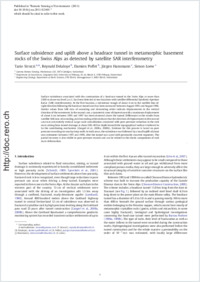Surface subsidence and uplift above a headrace tunnel in metamorphic basement rocks of the Swiss Alps as detected by satellite SAR interferometry
- Strozzi, Tazio Gamma Remote Sensing, Gümligen, Switzerland
- Delaloye, Reynald Department of Geosciences, Geography Unit, University of Fribourg, Switzerland
- Poffet, Damien Department of Geosciences, Geography Unit, University of Fribourg, Switzerland
- Hansmann, Jürgen Engineering Geology, Department of Earth Sciences, ETH Zürich, Switzerland
- Loew, Simon Engineering Geology, Department of Earth Sciences, ETH Zürich, Switzerland
-
25.02.2011
Published in:
- Remote Sensing of Environment. - 2011, vol. 115, no. 6, p. 1353-1360
Surface subsidence
Fractured rock
Tunnel construction
Groundwater drainage
Satellite SAR interferometry
Swiss Alps
English
Surface subsidence associated with the construction of a headrace tunnel in the Swiss Alps at more than 2000 m above sea level (a.s.l.) has been detected at two locations with satellite differential Synthetic Aperture Radar (SAR) interferometry. At the first location, a subsidence trough of about 4 cm in the satellite line-of-sight direction following the headrace tunnel axes has been measured between August 1995 and August 1996. Similar values from SAR data of ascending and descending orbits indicate displacements in the vertical direction of the movement. In the second case, a symmetric cone of depression with a maximum displacement of about 4 cm between 1995 and 1997 has been observed above the tunnel. Differences in the results from satellite SAR data of ascending and descending orbits indicate that the direction of displacement in this second case was not entirely vertical. Large-scale consolidation associated with pore-pressure reduction in the rock mass arising from tunnel drainage at about 200–400 m depth beneath the topographical surface is believed to be the contributing mechanism (Zangerl et al., 2008a, 2008b). Evidence for this process is based on pore pressure recordings in nearby deep wells. In both areas, the subsidence was followed by a small uplift of about one centimeter between 1997 and 1999, after the tunnel was cased with permeable concrete segments. This partial recovery is also visible in pore pressure records and can be related to the elastic components of rock mass deformation.
- Faculty
- Faculté des sciences et de médecine
- Department
- Département de Géosciences
- Language
-
- English
- Classification
- Earth sciences
- License
-
License undefined
- Identifiers
-
- RERO DOC 22277
- DOI 10.1016/j.rse.2011.02.001
- Persistent URL
- https://folia.unifr.ch/unifr/documents/301935
Statistics
Document views: 146
File downloads:
- pdf: 281
